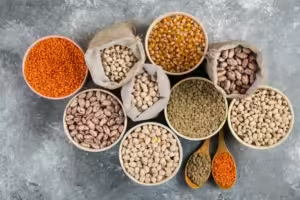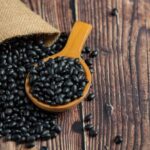The different types of pulses available are very beneficial for health, as they contain protein, fiber and many essential nutrients. Here are the types of pulses commonly found :

Types of Pulses:
1. Lentils:
Brown lentils: This is the most common variety and has a mild flavour and becomes soft when cooked.
Bean Lentils: It has a mildly spicy flavor and holds its shape when cooked.
Red lentils (split): These cook quickly and turn into a soft texture, making them perfect for soups and purees.
Black Beluga Lentils: These are small, black lentils that look like caviar and have an earthy taste.
2. Chickpeas :
Chickpeas: These are large, light cream colored and commonly used in hummus and salads.
Desi Chana: These are small and dark in colour and are used more in Indian food. Its texture is hard.
3. Beans :
Black Beans: Small, black beans with a creamy texture. Used in Latin, American and Caribbean dishes.
Kidney Beans: These large beans, available in red and white, are commonly used in soups and chili.
Pinto Beans: These pink colored beans turn brown when cooked. They are used in Mexican food.
Navy Beans: These are small, white beans and are often added to baked beans and soups.
Cannellini Beans: These are white beans larger than navy beans that have a slightly nutty and earthy flavor.
4. Peas:
Green peas (split): Dried peas that are split down the middle are commonly used in soups.
Yellow Peas (Split): Similar to green peas but with a slightly milder flavor.
5. Other pulses :
Black eyed peas: Light cream coloured peas with small black spots. Very popular in Southern dishes
Moong Dal: These are small green lentils. Popular in flaky and Asian cuisine.
Fava Beans: Broad beans with a slightly bitter flavor. Used in Mediterranean and Middle Eastern cuisine.
All of these types of lentils are readily available at grocery stores and can be purchased dried, canned, or in some cases, even frozen. Let us further discuss their health benefits and how they can consume.
Health benefits of lentils :
Lentils is very beneficial for health and is widely used in Indian food. It contains protein, fiber, and many essential nutrients. Let’s know its benefits and ways to eat it.
1. Rich in Protein: It is a good source of protein for vegetarians; it provides strength and energy to the body.
2. Helpful in weight loss: It is high in fibre, which keeps you full for a long time and prevents overeating.
3. Beneficial for heart health: Lentils have low cholesterol content, which helps in preventing heart diseases.
4. Improves digestion: The fibre present in it improves the digestive system and provides relief from constipation.
5. Good intake of iron and folic acid: It helps in curing anaemia and is beneficial for pregnant women.
6. Blood Sugar Control: It is digested slowly, which helps in maintaining stable blood sugar levels.
Ways to Use lentils :
1. Plain dal: It can be cooked in a simple way and eaten by adding some salt and turmeric. It can be served with rice or roti.

2. Lentil soup: Boil lentils and use them as soup. The taste can be enhanced by adding ginger, garlic and some spices to it.
3. Use in salad: Boiled lentils can be eaten by adding them to salad. A nutritious salad can be prepared by adding onion, tomato, cucumber and lemon to it.
4. Dal Paratha: Cook the lentils well and make stuffing from it and fill it with flour paratha.
5. Khichdi : Masoor lentils can be used to make a delicious and light khichdi which is cooked with rice.
You can avail all the health benefits of lentils by including them regularly in your diet. It is easily digestible and tasty.
Health benefits of Gram dal :
Gram dal is very beneficial for health. It contains many essential nutrients which are essential for our health.
1. Rich in Protein: Gram dal is a good source of protein, which helps in strengthening the muscles and increasing the energy of the body.
2. Rich in fibre: It is high in fibre, which helps in keeping the digestive system healthy and prevents constipation.
3. Sugar control: Gram dal is digested slowly, so blood sugar does not increase suddenly. It is a good option for diabetes patients.
4. Helpful in weight loss: Due to low calories and high fiber content, it can help in weight loss. Eating it keeps the stomach full for a long time.
5. Heart health: It contains less cholesterol, which reduces the risk of heart diseases.
6. Good source of iron: Bengal gram dal contains iron, which increases the amount of haemoglobin in the blood and keeps the body away from fatigue.
Ways to use Bengal gram dal :
There are many ways in which gram dal can be easily incorporated into your diet:
1. Lentils: The most common way to eat it is by cooking it as dal. It can be prepared by boiling it with turmeric, salt, and spices.
2. Gram dal khichdi: Mix rice and gram dal to make a delicious and nutritious khichdi
3. Gram Dal snacks: It can be soaked and used as gram flour for snacks called pakodas . It can be made by adding green chillies, onions, and spices to it.
4. Gram Dal Salad: Boiled gram dal can be eaten as palad, which can be made even more tasty and healthy by adding tomatoes, cucumber, onion, and lemon juice.

5. Sweet Dal: It is also eaten as sweet dal with sugar or jaggery, which is especially made during festivals.
By including gram dal in your diet, the body gets many nutrients and health is also maintained.
Health Benefits of Beans :
Beans (such as black beans, kidney beans, pinto beans, etc.) are very beneficial for health. They contain protein, fiber, and many essential nutrients that keep the body strong and healthy. Here are some health benefits of beans and how to use them:
1. Good source of protein: Beans contain a lot of protein, which strengthens the muscles and gives energy to the body. It is a good protein option especially for vegetarians.
2. Rich in Fiber: It contains a good amount of fiber, which improves the digestive system and prevents problems like constipation.
3. Helpful in reducing cholesterol: Eating beans reduces bad cholesterol (LDL) in the body.
4. Vitamins and Minerals: Beans contain nutrients like iron, folic acid, magnesium, potassium, which help in controlling anemia, strengthening bones and blood pressure.
5. Helpful in weight loss: Eating beans makes you feel full, due to which you eat fewer calories and your weight remains under control.
Method of Use (Cooking and Usage Tips):
1. Boil and use: Soak the beans overnight, then boil them well. It can be eaten by mixing it in salad, soup, or stew.
2. In curry: Beans can be made into a delicious curry by adding spices. It is very tasty to eat with rice or chapati.
3. Soup: You can make soup by mixing beans with vegetables. This is especially beneficial for health in the winter seasons.
4. Snacks: A healthy snack can be made by mashing cooked beans and adding some salt, spices and lemon to it.
5. Chili: Cooked kidney beans can be combined with tomatoes, onions, garlic and chili powder to make a dish called chili, which is popular in American cuisine.
Beans are easily available, rich in nutrients and delicious. You can stay healthy by including them in your everyday diet.
Health Benefits of Peas:
Peas, commonly known as split peas, are very beneficial for health and can be used very easily. Let us understand its health benefits and method of use:

1. Rich in protein: Peas contains a lot of protein, which helps in body growth and muscle building. It is an excellent protein source for vegetarians.
2. Rich in fiber: This lentil is a good source of fiber, which improves digestion and helps in relieving problems like constipation. This makes the stomach feel full for a long time.
3. Helpful in weight loss: Peas has low calories, but it keeps the stomach full for a long time due to high amount of fibre and protein, which helps in weight loss.
4. Beneficial for the heart: It contains minerals like potassium and magnesium, which control blood pressure and improve heart health.
5. Antioxidant properties: Peas contain antioxidants, which protect the body from harmful free radicals and strengthen the immune system.
6. Controls blood sugar: Being rich in fibre and protein, this dal helps in controlling blood sugar level, which is beneficial for diabetic patients.
Method of use of pea lentils:

1. Soup: Delicious and nutritious soup can be made from pea lentils. Prepare the soup by boiling it with onion, tomato, ginger, garlic.
2. Dal: Like regular dal, it can be cooked with turmeric, cumin, asafoetida and spices. It can be eaten with rice or roti.
3. Khichdi: Peas dal can also be used to make khichdi, which is light and tasty. It is easily digestible.
4. Chaat: It can be described as a spicy chaat made from boiled peas. It has lemon, onion, tomato.
A delicious snack is prepared by adding green chillies and chaat masala.
5. Kababs and Tikkas : Kababs can also be made from pea lentils. Mix spices in boiled lentils and lightly fry them on a pan.
Peas are easily available and their consumption is very beneficial for health. You can get many benefits by including it in your daily diet.
Health Benefits of Lobia :
Black eyed peas (also known as lobia) are very beneficial for health. It contains many nutrients, such as protein, fiber, iron, potassium and folate. Let’s know its benefits and how it can be used:

1. Good source of protein: Black eyed peas are rich in protein, which is essential for muscle repair and body growth.
2. Rich in fibre: It is rich in fibre, which keeps the digestive system healthy and prevents constipation.
3. Beneficial for heart health: Lobia is low in fat and helps control cholesterol, thereby reducing the risk of heart diseases.
4. Rich in Iron: Black eyed peas replenish iron deficiency in the body, thus preventing anaemia.
5. Source of potassium and magnesium: These minerals help control blood pressure and strengthen bones.
How to Use Black Eyed Peas:
1. In the form of pulses: You can make it like dal with rice or roti. For this, soak the beans in water for a few hours, then cook it with onion, tomato, ginger-garlic and spices.
2. In salad: Boiled black eye peas can be eaten as a salad. Mix it with cucumber, tomato, onion and your favorite dressing.
3. In soup: It can also be used in soups. A nutritious soup can be prepared by boiling Lobia with vegetables and spinach.

4. In the form of chaat: You can make a delicious chaat by mixing boiled black eye peas with lemon, chaat masala, green chillies, onion and coriander.
5. As a curry: Lobia can be cooked in a spicy gravy and served as a curry. Eat it with rice or paratha.
You can make many delicious and healthy dishes from black eyed peas. These are nutritious as well as delicious in taste.
Health Benefits of moong dal:
Moong daal is a very healthy and nutritious dal that can be easily included in your diet. It has many health benefits and is also light to digest.
1.Rich in Nutrients: Moong dal contains many nutrients like protein, fibre, vitamin B, iron and magnesium, which keep the body strong and healthy.
2. Beneficial for digestion: This dal is easily digested, so it is considered light on the stomach. It helps in reducing stomach problems like constipation and indigestion.
3. Helpful in weight loss: Although it is low in calories, it is rich in fibre, which reduces hunger and helps in controlling weight.
4. Good for heart health: Regular consumption of moong dal helps in keeping the heart healthy as it contains antioxidants and potassium which controls blood pressure.
5. Strengthens the immune system: It contains vitamin C and other elements, which are helpful in increasing immunity.
How to use moong dal:
1. Plain Moong Dal: It can be boiled, lightly spiced and eaten with rice or roti. It is a simple and nutritious meal.
2. Dal Khichdi: Khichdi can be made by mixing moong dal with rice. It is very beneficial for children, elderly and sick people.
3. Sprouts: Moong dal can be sprouted and eaten as salad or breakfast. It is a good source of vitamins and minerals.
4. Soup: Moong dal soup can be made and drunk, which is beneficial for health and tasty.
Regular consumption of moong dal can provide many health benefits to the body.
Health Benefits of Fava Beans:
Fava beans (also known as broad beans) have many health benefits. They are rich in nutrients and help prevent many diseases. Here are some of its health benefits and ways to use them.
1. Rich in Protein: Fava beans contain a good amount of protein, which is essential for strengthening body muscles and repairing cells.
2. Rich in fibre: It contains a good amount of fibre, which improves digestion and keeps the stomach full for a long time.
3. Good source of iron: Fava beans are rich in iron, which helps in increasing hemoglobin in the blood and prevent anemia.
4. Beneficial for heart health: The fibre and antioxidants found in it help in keeping the heart healthy and control cholesterol levels.
5. Helpful in weight loss: It helps in weight loss due to its low calories and high fiber content as it reduces hunger after eating it.
6. Good source of Vitamin B: It contains Vitamin B, which is beneficial for the brain and nervous system.
Ways to use fava beans:
1. Soup: Fava bean soup is very popular. It can be boiled and mixed with spices to make a delicious and nutritious soup.
2. Salad: Boiled fava beans can be added to salad. Prepare a healthy salad by adding tomatoes, cucumber, onion and your favorite spices to it.
3. Dal: Fava beans are an easy dish to make. Cook them like any other dal, add spices and eat them with rice or roti.
4. Stir-fry: Mix it with veggies, lightly fry it and have it as a healthy snack!
5. Dip or Paste: You can boil and grind it to make a dip or paste like hummus, which can be eaten with bread or crackers.
Regular consumption of fava beans can be very beneficial for your health. You can easily include it in your everyday diet.
You may like to read:
Health Benefits of Fruit Juices
Health Benefits of Juices (Vegetable)
Conclusion:
Pulses are a valuable health food that not only tastes delicious but also provides many nutritional benefits. They contain important elements like protein, fiber, vitamins, and minerals that help maintain our health. By consuming pulses regularly, we can control weight, improve digestive system, promote heart health, and maintain energy levels.
In today’s busy lifestyle, when the consumption of junk food is on the rise, adding pulses to your diet is a smart and healthy option. Be it salads, soups, or main meals, pulses are not only a good source of nutrients but also add variety and taste. So, tell your family and friends about the benefits of pulses and encourage them to include them in their daily diet. Adopt pulses for a healthy life and improve your health.
<head><script async src=”https://pagead2.googlesyndication.com/pagead/js/adsbygoogle.js?client=ca-pub-3317204152971892″
crossorigin=”anonymous”></script></head>